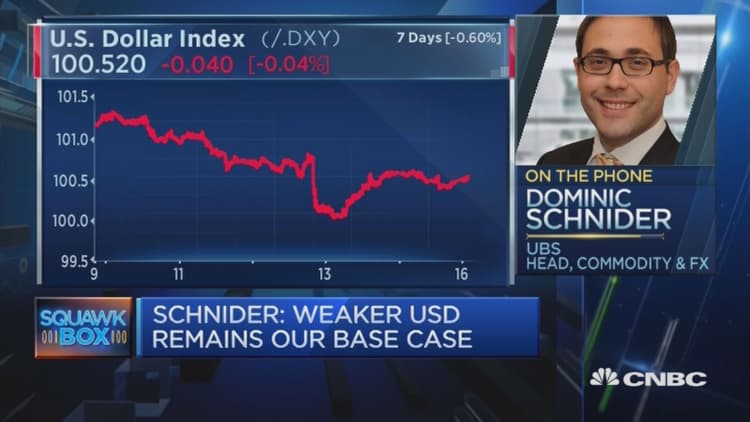
The dollar's recent downdraft hasn't ended, with further weakness likely ahead, Dominic Schnider, head of Asia-Pacific foreign exchange at UBS, told CNBC's "Squawk Box" on Monday.
The , which measures the greenback against a basket of currencies, was trading as high as 100.47 in Asia trade, that's up from as low as 100.01 in Asia trade on Thursday, but off levels around 100.50 touched in U.S. hours Thursday.
The index was above 101 early last week, but took a hit after U.S. President Donald Trump complained the currency was "getting too strong" in an interview with The Wall Street Journal. Schnider expected the dollar would fall further.
"The starting point for the dollar into 2017 was just very, very rich in terms of valuation," he said. In January, the dollar index climbed over 103.
"As we see more disappointment, from Trump's policies and at the same time, the world outside the U.S. looks better, I think we're still going to see that continuation of dollar weakness. It's not going to be a weak currency, but the dollar continues to slide on a trade-weighted basis," Schnider said.
He expected the greenback would see a "mid-single-digit decline" on a trade-weighted basis.
That relative weakness can mainly be laid at Europe's door, he noted. The dollar index is heavily weighted toward the euro.
"We do think the euro is heavily undervalued, with a chance that actually the ECB might taper in the second half of the year, then the euro/dollar should see a decent recovery," he said
The European Central Bank has planned to buy 60 billion euros of bonds every month this year, but analysts have expected that would cease next year, or even earlier, if the economy continued to show improvement.
Schnider forecast the pair could rise to as high as 1.20 over the next six to 12 months; the euro/dollar was at 1.0622 in Asia morning trade on Thursday.
"That gives on a trade-weighted basis, quite a down draft" for the dollar, he said. "At the same time, we do think some of the Asian currencies could still go a little bit given that on the cyclical side, we do look much better. "
While the U.S. Federal Reserve appeared to be the only major central bank poised to raise interest rates, which would appear to provide a tailwind for the dollar, Schnider didn't believe that would affect his forecast.
"Higher rates per se do not always translate into a stronger currency," he said. "The starting point is very important. The dollar was massively overvalued. We're just going to see some correction of that overvaluation."
To be sure, Schnider noted that some shocks could derail his view. If the U.S. passed a tax reform that included a border-adjustment tax, which would penalize imports into the country, that would likely boost the dollar, he said, but added that he gave that a "really small probability."
Analysts have adjusted their expectations downward for Trump's ability to push policy changes through Congress.
Last month, Trump failed to usher a Republican health-care reform bill through a seemingly friendly Congress in a development some analysts labelled a "fiasco," broadly raising doubts about the administration.
Expectations that a Trump administration would boost infrastructure spending and reform tax policies had been at least partially responsible for the recent market rallies.
—By CNBC.Com's Leslie Shaffer; Follow her on Twitter @LeslieShaffer1


